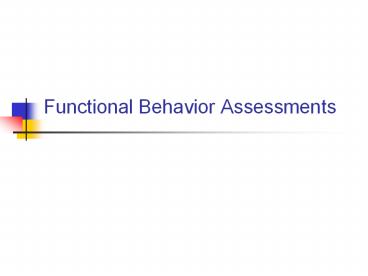Functional Behavior Assessments - PowerPoint PPT Presentation
1 / 11
Title:
Functional Behavior Assessments
Description:
Functional Behavior Assessments What is a FBA? The term Functional Behavioral Assessment comes from what is called Functional Analysis in the field of ... – PowerPoint PPT presentation
Number of Views:145
Avg rating:3.0/5.0
Title: Functional Behavior Assessments
1
Functional Behavior Assessments
2
What is a FBA?
- The term Functional Behavioral Assessment comes
from what is called Functional Analysis in the
field of applied behavioral analysis. - - Process of determining the function
or cause - of the behavior before developing an
intervention - - Intervention is base on the
hypothesized - cause(function) of behavior
- http//www.wrightslaw.com/phprint.php
3
Why Do Functional Behavioral Assessments?
- If Interventions are not based on the specific
cause (function) then the results may be
ineffective and too restrictive - Example
- Behavior Screaming- an effective in avoiding an
unpleasant task - Intervention Timeout
- Result Provides the child the desired result-
avoidance - http//cecp.air.org/fba/problembehavior/necessary.
htp - http//www.wrightslaw.com/phprint.php
4
Determining the Cause or Function of Behavior
- Interviewing and rating scales
- Direct and systematic observation of the persons
behavior - Manipulation of the environmental events to see
how behavior changes - http//cecp.air.org/fba/problembehavior/necessary.
htp - http//www.wrightslaw.com/phprint.php
5
Types of Problem Behavior
- Attention
- Avoidance
- Sensory Consequences (pain, feels good,etc.)
- http//cecp.air.org/fba/problembehavior/necessary.
htp - http//www.wrightslaw.com/phprint.php
- http//mfba.net/index.html
6
Antecedents-Behavior-Consequences
- A.B.C.
- Antecedents-environmental events that immediately
precede the problem behavior - Behavior- actions that occur after the antecedent
- Consequences-environmental events that
immediately follow the problem behavior - http//mfba.net/index.html
7
Systematic Manipulation of Environment
- Why is the child screaming?
- 1. Arrange attention to be given to student
each time he/she screams. Measure how frequently
screaming occurs. If screaming is more frequent
when attention is given, then hypothesis is that
the function of the behavior is to get - attention.
- 2. Make demands on the child, ending the
demand when the child screams and measure how
often screaming occurs. - If screaming is more frequent when
demands are made, then the hypothesis is that the
behavior is a means to avoid a demand. - 3. When behavior is more frequent when
child is left alone, the behavior may be
occurring due to sensory consequences(this method
is used only for situations in which the
functions of the behavior are not clear through
systematic and direct observation) - http//www.wrightslaw.com/phprint.php
8
Developing a Plan
- Define the problem(goal or obstacle?)
- List possible solutions
- Determine the likely consequences of each
solution - Evaluate each solution to determine the best
solution will help solve the problem (long term) - Pick a solution
- Plan how to carry out the solution
- Carry out the solution
- Evaluate the effectiveness of the solution
- http//cecp.air.org/fba/problembehavior/necessary.
htp
9
Methods To Teach Necessary Skills
- Task Analysis may be required to break down a
skill into its components parts - Cueing (private between teacher and child)
- Possible medical interventions
- Teach child needed skills through
- Academic tutoring
- Behavioral and Cognitive Skills
Training - http//cecp.air.org/fba/problembehavior/necessary.
htp
10
Curricular Instruction
- Social skills instruction in the regular
classroom setting - Role playing
- Modeling by teacher or peer
- Time to practice social skill with peers
- http//cecp.air.org/fba/problembehavior/necessary.
htp
11
IEP Services
- Small group instruction
- Individual Instruction/therapy
- http//cecp.air.org/fba/problembehavior/necessary.
htp

